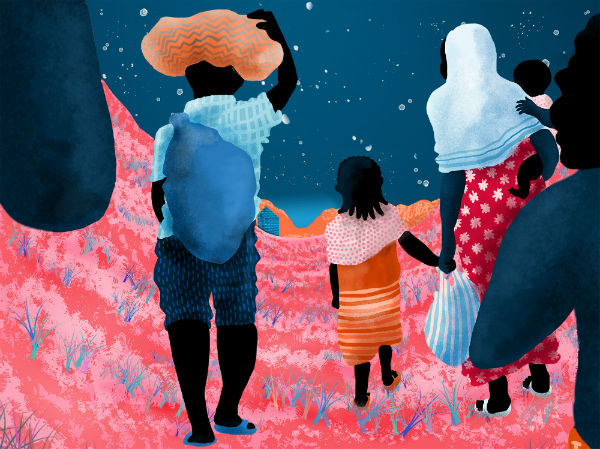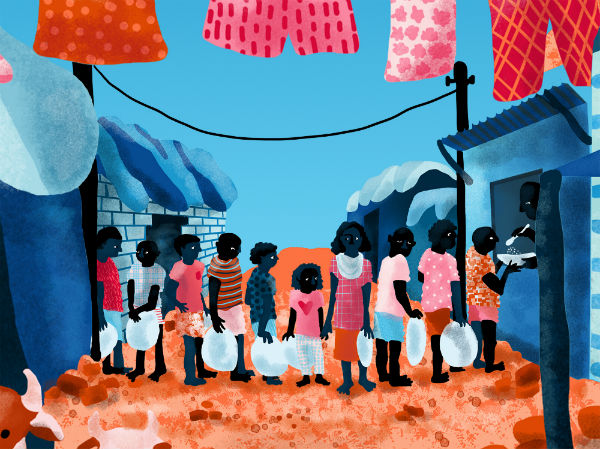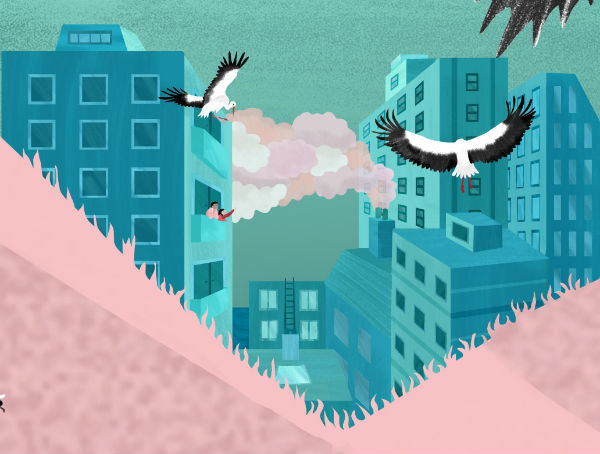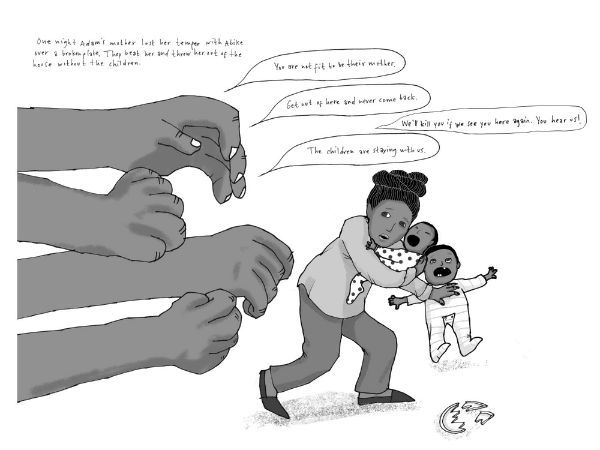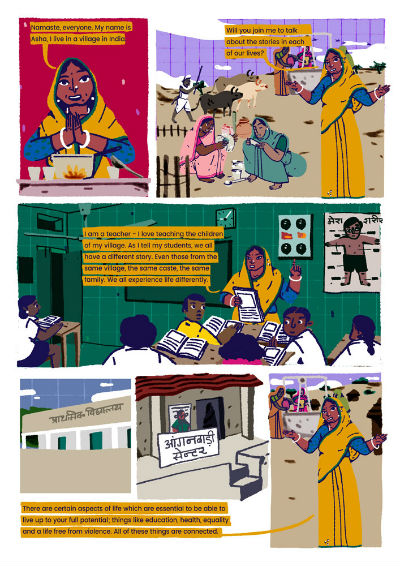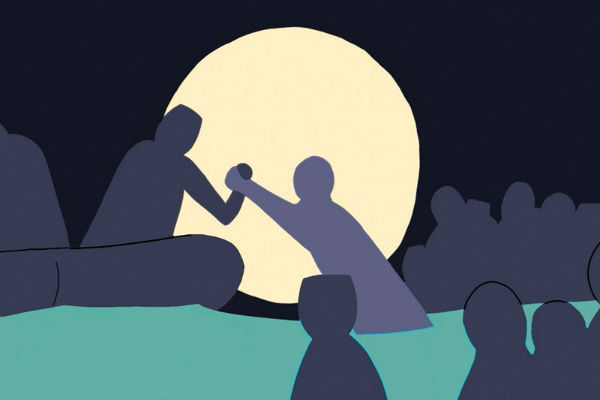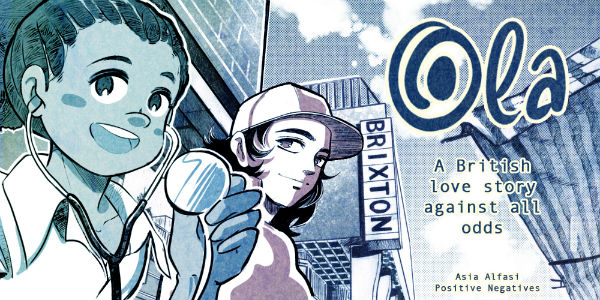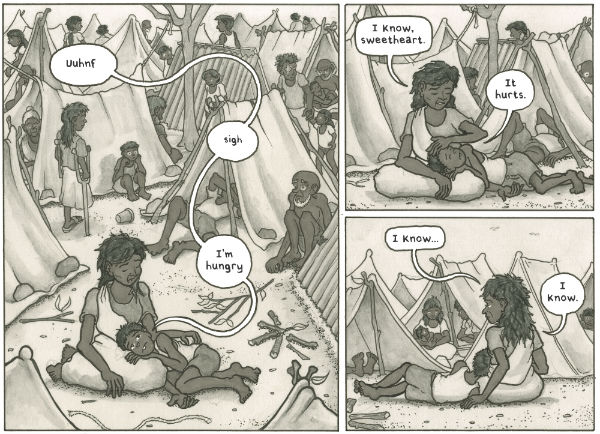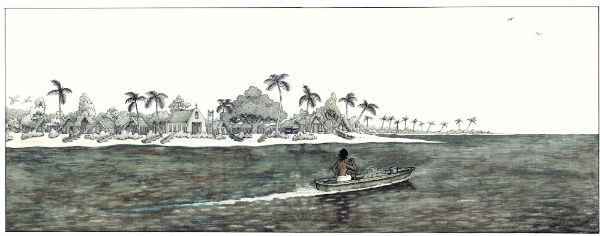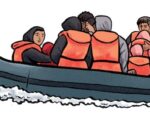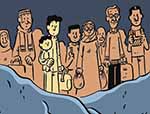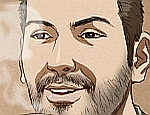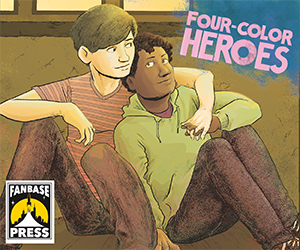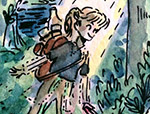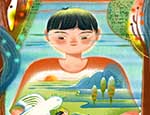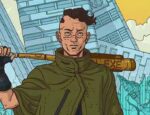The vitally important work of PositiveNegatives has been spotlighted before here at Broken Frontier but admittedly not nearly enough. Their growing online catalogue of comics and animation explores “contemporary social and humanitarian issues, including conflict, racism, migration and asylum.” You can read more on their site here; powerful topical accounts that emphasise what a connective medium comics is for communicating personal experience in the most empathetic way.
We’re very pleased to showcase PositiveNegatives’ projects today at BF as we chat with the team about their origins, their aims and ethos, and their first graphic novel Vanni: A Family’s Struggle through the Sri Lankan Conflict…
Art from North Star Fading by Karrie Fransman
ANDY OLIVER: To begin with, for the uninitiated amongst the Broken Frontier audience, can you give us the origins of PositiveNegatives, the types of global issues you exist to cover and some of the organisations you have worked with?
PostiveNegatives: Okay! PositiveNegatives was first imagined by our Founding Director, Dr Benjamin Dix, after he returned from working for the UN in northern Sri Lanka. Ben was posted there, in a region called Vanni, from the tsunami in 2004 until towards the end of the fighting in 2008. As the fighting intensified Ben and his colleagues were forced to shelter in an underground bunker during intense bombardment. During Ben’s long, boring hours underground he read the graphic novel Maus by Art Spiegelman and life was never the same again.
Ben left Sri Lanka in September 2008, following the UN’s evacuation from Vanni and he was still thinking about how comics, like Maus and Joe Sacco’s Palestine can depict traumatic, real-life experiences. He’d lost many Sri Lankan colleagues and friends during the conflict and, after battling PTSD for several years, he began a PhD at the University of Sussex on comics, conflict and migration. This was due to be accompanied by a short graphic novel, created with the artist Lindsay Pollock, about the civil war Ben had witnessed and the often-unseen human cost of the bloody conflict.
Art from North Star Fading by Karrie Fransman
During his postgraduate studies Ben began to think about establishing an organisation (PositiveNegatives) that would turn people’s testimonies, their real life experiences, into comics. From its beginning, PositiveNegatives was an attempt to tell the stories of people who’d previously been ignored in news coverage, or left out pre-existing narratives. What started as a PhD thesis and a small comic quickly morphed into a much wider organisation.
So in many ways PositiveNegatives was born from Ben’s chance encounter with a graphic novel while sheltering in the middle of a war zone. But this is only the beginning of our story. Since 2012 we’ve rapidly expanded, as PositiveNegatives has produced comics and animations on a wide range of contemporary social and humanitarian issues, including conflict, racism, migration and asylum. Beyond comics we also adapt personal stories into art, advocacy and education materials.
2019 is a particularly exciting year for us, as we’ve just published our first graphic novel, partly inspired by Ben’s experiences in Sri Lanka, called Vanni: A Family’s Struggle Through the Sri Lankan Conflict. It’s out now with the New Internationalist. The ‘small comic’ that Ben and Lindsay first imagined in 2012 morphed into an epic seven year journey!
Our work would be impossible without the fantastic organisations we’ve partnered up with over the last seven years. These have included The Guardian, Open Society Foundations (OSF), BBC, The Nobel Peace Centre, Overseas Development Institute (ODI) and the United Nations (UN), and academic institutions such as; Harvard South Asia Centre, SOAS University of London, University of Sussex and the Peace Research Institute Oslo (PRIO).
A Stork’s Journey by Karrie Fransman
AO: Who makes up the team at PositiveNegatives?
PostiveNegatives: As we’ve mentioned, Ben is our Founding Director and he oversees our daily operations along with Emily Oliver, our Managing Director. Emily previously helped launch peoplefund.it (which became the UK’s largest crowdfunding platform, Crowdfunder) after establishing the arts services for the London Borough of Newham. Along with Ben and Emily our team includes two full-time research and project managers, Sara and Laura, both of whom arrived at PositiveNegatives after postgraduate study. Laura has a PhD in Human Geography, having written a thesis on craft as activism (she’s an expert in guerilla knitting!) Sara holds an MSc in Development Studies and her expertise is in conflict and human rights, particularly in Myanmar. As if all that weren’t cool enough, Sara is also a semi-professional footballer.
Along with our full-time staff, PositiveNegatives is also made up of a network of consultants, artists and other partners. We’re an ever-expanding crew and feel very lucky to have so many ace people onboard.
Art from Abike’s Story illustrated by Gabi Froden, commissioned by The Guardian and facilitated by The Poppy Project
AO: Given the nature of the stories you tell what is it about comics and graphic narrative that makes the form such an effective tool in communicating those personal experiences?
PostiveNegatives: We’re all firm believers that visual storytelling is a vital way to tell challenging, complex stories. Obviously we began with comics, particularly in Ben’s early collaborations with artist Lindsay Pollock. It was clear that this form was capable of depicting both traumatic memory and the long-term impact of experiences like forced migration. But recently PositiveNegatives have expanded into other visual mediums, producing stop-motion animations, ‘infinite zoom’ comics and a whole host of free learning resources to support educators who want to use our materials.
In early PositiveNegatives projects like Abike’s Story, which tell one woman’s experiences of modern day slavery and sex-trafficking, it became clear that Abike was not in a position to reveal her real identity. She wanted to tell and share her story, but it was vital that her identity wasn’t revealed in the process, not least as she’s still traumatised by her experiences of sexual slavery and is currently building a new life with her children. In really difficult cases like Abike’s, comics are a powerful way to tell stories while ensuring complete anonymity.
There’s also the additional benefit that, despite the clear complexity of the comics form, the visual medium also allows accessibility amongst different groups of readers. We’ve been able to take our stories to readers, classrooms and public spaces all over the world. There’s an obvious added bonus that our comics can cater to varying literacy levels while also amplifying the voices of marginalised communities.
Art from Drawing on Rights by Kruttika Susarla, a collaborative project with Barefoot College’s Enriche Program and Hogan Lovells Citizenship.
AO: Can you describe the process of how you gather the information and testimonies that form the basis of the comics you publish online, and the fieldwork involved?
PositiveNegatives: Our approach varies depending on the project, but it always starts with background research on the context of this story. We have the privilege of working with people who have a deep understandings of incredibly complex situations – often through lived experience. We try to honour that by working with artists who can bring their own experience into the project, and offering participants who are sharing their own stories the opportunity to be at the heart of that process, or to choose how much distance they have.
Next we might run co-creation workshops with the artist and participant, or one or two members of the team will travel to meet the person/people we are interviewing for a face-to-face conversation. Sometimes this isn’t possible: they might not be able to speak to us in person or, occasionally, it’s too dangerous for us to travel to them. When this happens we’ll conduct an interview via a trusted partner on the ground (typically an NGO or charity based in the region) or to have a conversation via Skype.
Ideally, while our researchers and artist are conducting fieldwork we’ll also collect plenty of photographs so that when it comes to drawing this story, details like what people are wearing, eating and doing are as accurate as possible.
Next, comes a collaborative scripting and storyboarding process based on the interviews, and the original participants are then invited to give feedback on the script and storyboard, and to suggest changes if necessary. It’s important that it actually represents their story, as they want to tell it.
As you can see, this is all designed to be a very collaborative process and it has to vary with every project that we do, which involves different storytellers, partners and creates different end results, from zoom animations to comics. What remains the same within each project is that we look for the best way of including the storyteller at every stage.
We’re increasingly using systems thinking to collaborate with partners. This involves co-designing different ways to bring stories meaningfully into the world. Once completed the project is uploaded onto our website (under a creative commons license wherever possible) for everyone to use, download and share for free.
AO: If we look for a moment at the artists you have worked with to date there’s a marked diversity of styles in the practice of creators like, for example, Asia Alfasi or Majid Adin. What are you looking for in terms of approaches to visual storytelling and how do you connect an individual’s styles with specific subject matter?
PositiveNegatives: We work creatively with a wide diversity of styles and people and we are always on the look-out for new creators we can work with. Often when we’re looking for an artist we have a particular project in mind and that will affect who we look for as each project comes with its own needs and requirements. Sometimes we’ll be looking for creators that have lived experience of the issue(s) discussed in the project.
A good example of this last scenario is Majid Adin. Majid arrived as a refugee in the UK, having spent six months in the infamous Calais jungle. Shortly after arriving in the UK he won a competition to create a music video for Elton John’s ‘Rocketman’ which was a massive viral hit and has over 50 million views on YouTube to date.
We got in touch with Majid because we were planning a project about the lives and experiences of unaccompanied child migrants in the UK. This would eventually turn into the PositiveNegatives’ animation Dear Habib (above) which illustrates the findings of a major research project across UK universities on the subject of child migration. It was obvious to us that Majid’s incredible expertise as an animator and his lived experience as a person were a perfect match for this project.
However, the process of choosing an artist is not ours alone! It’s also up to the person whose story we’re telling. Ideally, they need to feel a connection with the creator and their style, and if this is a commissioned project then we need a consensus from our funders and partners as well.
We’ve given you a long answer here! But in a nutshell, it is not just about PositiveNegatives loving someone’s creative style, but about who they are and what project is it that we will be asking them to work on.
AO: There are also animations of some of the comics available, and projects like the zoom comic North Star Fading by Karrie Fransman, Lula Mebrahtu and Jonathan Plackett (above). Are you actively looking to expand the types of media and methods of delivery you use?
PositiveNegatives: We are definitely interested in expanding the media we work with. We’re certainly not committed to only producing comics — although they’re a vital part of our portfolio — and we’re increasingly branching out into other visual forms.
For example, one of our most recent works is a stop-motion animation called Life on the Move, co-created with Karrie (Fransman) and the amazingly talented director Osbert Parker. The film explores the many reasons why people choose to move across borders and, alongside the animation, we also produced a cool ‘making of’ documentary which gives viewers a behind-the-scenes glimpse of its development.
For us it’s all about matching a story to whatever visual form works best and we’re definitely looking to expand our experimental horizons here! If any of your readers are using different creative ways to communicate stories and would like to share these with us we’d love to hear from them — please get in touch on our website: www.positivenegatives.org
Asia Alfasi’s art from Ola
AO: In terms of raising awareness and your aim of driving social change what have been some of the highlights over the last few years and, conversely, what have been some of the challenges in using comics as a prime method of communication?
PostiveNegatives: A huge highlight for the team this year has been launching our Webtoons-based comic series, Ola, which has garnered over 120,000 views on Webtoons so far. Ola is a unique staged-release comic, highlighting the challenges confronted by many young people in the UK who are undocumented.
We’ve been completely overwhelmed by the feedback we’ve received on Ola from our online readers, many of whom are teenagers. We’ve had comments like “I live in east London and this comic is literally relating to something my friends are going through and what I’ve experienced.” This was the best response we could have hoped for and we’re all really excited to see how Ola develops in the future.
Beyond this it’s also been really gratifying to develop our new range of learning resources via our educational platform, PosNeg Learning, and to see school teachers and educators using these for the first time.
One of our main current challenges is that our work and projects are spreading to so many countries, not all of whom have a culture of reading or engaging with comics. That said, despite the amazing work of comics collectives and artists from all over the world, the comics scene in the UK can be a tad Euro-centric. As we begin to plan our future projects we’re increasingly looking for new ways to collaborate, meaningfully, with artists and creators outside of Europe
That said, we’re now part of a major, long-term research project which looks at migration routes in the Global South. This project is committed to de-centering knowledge and research from the Global North and we’re really excited to see where these methodologies and approaches take us. We’re always up for the challenge of working in different ways and are committed to finding better, more equal forms of visual representation in the future.
Life on the Move, “a stop-motion animation exploring the complex reasons behind migration, showcasing research from the Horn of Africa as a case study”
AO: You mentioned your educational department, ‘PosNeg Learning’, how do PositiveNegatives develop learning resources in collaboration with educators?
PositiveNegatives: We’re currently exploring lots of ways to develop educational resources based on our visual stories. A good example of PosNeg Learning’s collaborative work is Maths of Migration, a project which offers lesson plans, learning resources and even powerpoint slides to secondary school maths teachers who want their students to think critically about statistics. It’s inspired by Karrie Fransman’s amazing ‘zoom comic’, co-produced with PositiveNegatives, North Star Fading, which is based on the testimonies of four Eritrean refugees.
For Maths of Migration PosNeg Learning joined forced with the awesome Jess Barnecutt, Head of Maths at Oaklands School in Bethnal Green. By working with Jess, PosNeg Learning created teaching packs and trialled a series of pilot lessons with Jess and Karrie over at Oaklands School. Jess’s students watched North Star Fading, before tackling a real-life data set on migration across the Mediterranean Sea. The students interrogated the data set and then displayed their findings through visual infographic posters. It was a real success and we’re already plotting more mischief with Jess, including teacher training days throughout the next six months, so watch this space!
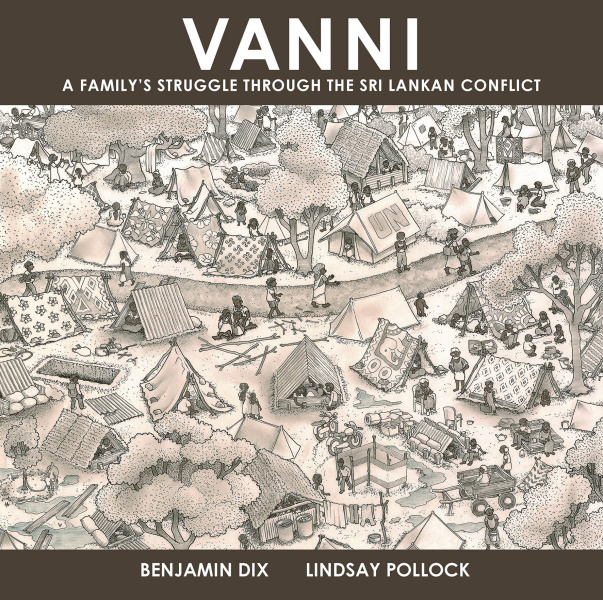
AO: You’ve concentrated on short-form comics and animations to date but you’ve just released your first graphic novel Vanni. Tell us a little bit more about that project?
PostiveNegatives: Vanni: A Family’s Struggle Through the Sri Lankan Conflict (art by Lindsay Pollock above and below), was released earlier this year with the New Internationalist and its publication in September marked 10 years since the end of civil war in Sri Lanka. Vanni is the story of two families caught up in the nightmarish events of, firstly, the Boxing Day tsunami in 2004 and secondly, the country’s brutal civil war. At its heart the book tries to portray the human cost of modern warfare, the processes of forced migration and the struggles of seeking asylum in Europe. Even those characters who survive these events are still, in the words of Priya, looking ‘for a reason to come back to life’.
As we’ve mentioned, the graphic novel was inspired by Ben’s personal experience of working in Sri Lanka for the UN and Vanni, named after the Tamil region of northern Sri Lanka, draws upon Ben’s four years of meticulous research – including first-hand interviews with survivors, references from official reports and cross-referencing with experts in the field.
Lindsay Pollock’s drawings have really brought this story to life, taking us through what are otherwise unimaginable personal struggles and the life-changing decisions families are forced to make when caught up in the violence of civil war. Like many of PositiveNegatives’ projects Vanni is a story about ordinary people trying to navigate extraordinarily difficult circumstances.
AO: And, finally, what are your plans for 2019 and beyond? Are there any new projects or commissions you can tell us about?
PositiveNegatives: As you might have guessed 2019 has been a huge and busy year for us! Along with the release of Vanni, we’ve co-created our first stop-motion animation with Life on the Move and gotten to work with a group of inspirational teenagers in the UK who have irregular citizenship status. Their stories formed the basis for Ola, our online webcomic and we feel so lucky that they decided to share their experiences with us.
Looking to the future we’re very excited to have joined a huge research project on South-South migration, inequality and development. The project has won backing from the UK government’s science and research funding agency to explore how migration between different countries in the global south (for example, between Ethiopia and South Africa) is affecting inequality and development in these regions.
Meanwhile PosNeg Learning are busy with a bunch of teacher training days over the next six months, as we’re beginning to see teachers and educators using our learning resources in their classrooms for the first time. We’ve got all sorts of plans for 2020 so keep in touch with us on twitter, facebook, instagram or sign up for our newsletter to get sneak previews of our upcoming work.






